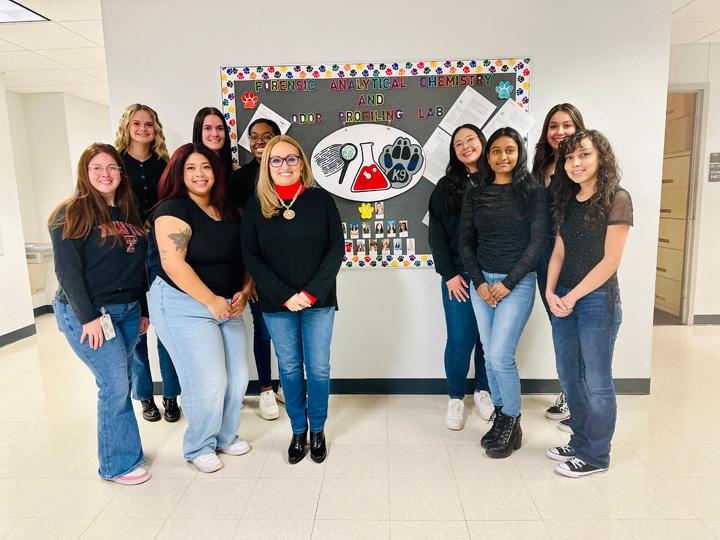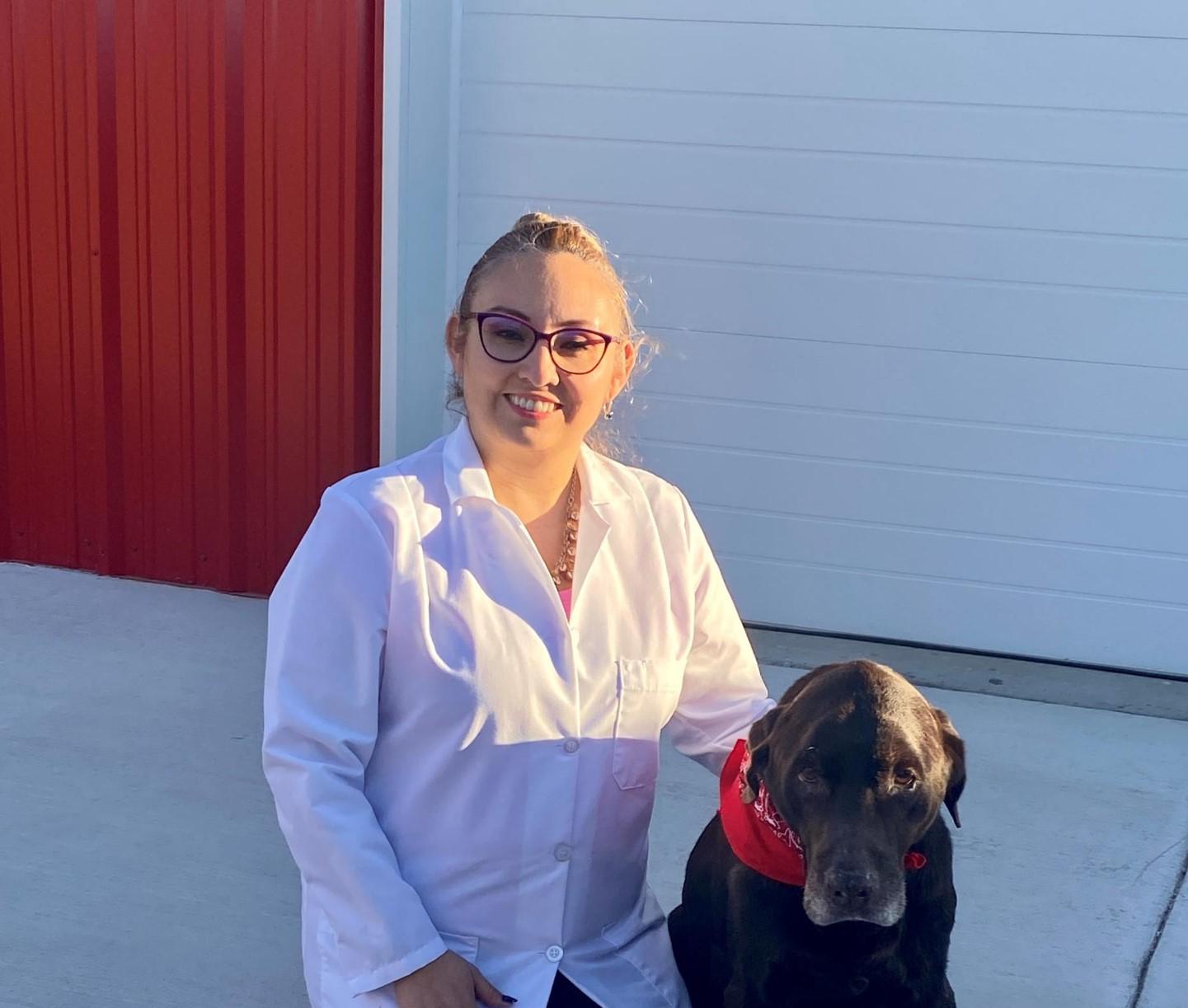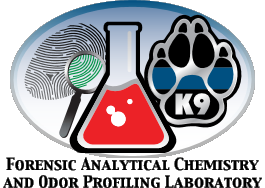 Forensic Analytical Chemistry
Forensic Analytical Chemistry
and Odor Profiling Laboratory
Dr. Paola A. Prada-Tiedemann
- Title: Associate Professor and Academic Program Director, Forensic Science
- Education: Postdoctoral Appointment,
Office of the Director of National Intelligence US - Government Fellowship, 2010-2012; Ph.D., Florida International University, 2010
- Research Area: Forensic Analytical Chemistry
- Office: Bldg 552, office 107A
- Lab: Bldg 555 Lab 120/121
- Phone: (806) 834-0983 (Office)
- Fax: (806) 885-4577
- Email: paola.tiedemann@ttu.edu
PRADA-TIEDEMANN RESEARCH GROUP FOCUS AREAS
At the Forensic Analytical Chemistry and Odor Profiling Lab, we bridge the gap between cutting-edge chemical analysis and practical forensic applications. Our research focuses on unraveling the complex chemistry of odors to enhance canine detection capabilities, driving innovation in law enforcement, public safety, and forensic science. By fostering interdisciplinary collaboration, advancing analytical techniques, and training graduate & undergraduate students, we aim to contribute to transformative solutions to the challenges of odor-based detection and identification.
Important principles and research questions in my laboratory are centered in utilizing headspace odor sampling techniques to address odor concepts to include:
· Odor identification
· Odor movement
· Environmental effects on chemical odor profile
· Odor persistence and stability
· Odor signature availability
These key aspects of odor can then be linked and utilized by the canine detection community to better understand the odor picture presented to the canines in operational settings. We are also interested in validating canine detection standards and protocols to provide research foundations for canine training regimens.
Our studies encompass several specimens of forensic, diagnostic and conservation importance to include:
· Explosives
· Human scent
· Decomposition (animal models and human cadavers)
· Firearms and related accessories
· Agriculture and pest detection
· Entomology
· Diseases
Selected Recent Publications (2022-present)
SA Kane, GN Cupp, M Rangel, A Medrano, J Davis-Miller, C Collins-Pisano, B Rogers,
D Copeland, L Lazarowski, P Waggoner, EO Aviles-Rosa, PA Prada-Tiedemann, N.J. Hall. The effect of training paradigm on dogs’ (Canis familiaris) acquisition
and generalization of Smokeless Powders, Applied Animal Behaviour Science, 2025, https://doi.org/10.1016/j.applanim.2025.106527
A Cantu, EO Aviles-Rosa, NJ Hall, PA Prada-Tiedemann. Evaluation of Volatile Organic Compounds from Spotted Lanternfly (Lycorma delicatula)
Eggs Using Headspace Odor Sampling Methods, Insects, 2024, 15 (10), 739, https://doi.org/10.3390/insects15100739
LS Fernandez, SA Kane, MT DeChant, P.A. Prada-Tiedemann, N. J. Hall Environmental effects on explosive detection threshold of domestic dogs
Plos ONE, 2024, 19 (9), e0306817, https://doi.org/10.1371/journal.pone.0306817
D.E. Huff, A. Cantu, S.A. Kane, L. S Fernandez, J. E. Cañas-Carrell, N. J. Hall, and
Paola A Prada-Tiedemann. Odor Dilution Assessment for Explosive Detection, Analytica, 2024, 5(3): 402-413.
https://doi.org/10.3390/analytica5030025
A.C. Medrano, A. Cantu, E. Aviles-Rosa, N. J. Hall, M.N. Maughan, J. D. Gadberry,
and P.A. Prada-Tiedemann. Chemical Characterization of Human Body Odor Headspace Components. Separations,
2024, 11(3): 85, https://doi.org/10.3390/separations11030085
E. Aviles-Rosa, A.C. Medrano, A. Cantu, P.A. Prada-Tiedemann, M. N. Maughan, J. D. Gadberry, R.R. Greubel and N. J. Hall. Development of an automated
human scent olfactometer and its use to evaluate detection dog perception of human
scent. PLoS ONE, 2024, https://doi.org/10.1371/journal.pone.0299148
S.A. Kane, L. Fernandez, D. Huff, P.A. Prada-Tiedemann, and N. J. Hall. Canine detection of explosives under adverse environmental conditions
with and without acclimation training. PLoS ONE, 2024, https://doi.org/10.1371/journal.pone.0297538
S.F. Gallegos, E. Aviles-Rosa, M.T. Dechant, N. J. Hall and P.A. Prada-Tiedemann. Explosive Odor Signature Profiling: A Review of recent advances in technical analysis
and detection. Forensic Science International, 2023,347: 11652. https:// https://doi.org/10.1016/j.forsciint.2023.111652
M. Bruskern, R. Thompson, S. Lawhon, K. Good, P. Bunker, P.A. Prada-Tiedemann, N. J. Hall. Effect of Rapid Changes in Environmental Conditions on Canine Detection
of Methyl Benzoate. Applied Animal Behavior Science, 2023,264: 105924.
M.T. Dechant, E. Aviles-Rosa, P.A. Prada-Tiedemann and N. J. Hall A Laboratory Model of Canine Search Vigilance Decrement, III: Training
with Progressively Leaner Schedules of Odor Prevalence. Journal of the Experimental
Analysis of Behavior, 2023, 2023, https://doi.org/10.1002/jeab.841.
M.T. Dechant, E. Aviles-Rosa, P.A. Prada-Tiedemann and N. J. Hall. Part II: Non-contingent Reward and Pavlovian Appetitive Stimuli Do
Not Improve Detection Dog Search Behavior and Performance Under Infrequent Target
Odor. Journal of the Experimental Analysis of Behavior, 2023, http://dx.doi.org/10.1002/jeab.838
E. Aviles-Rosa, M.T. Dechant, P.A. Prada-Tiedemann and N. J. Hall. Leveraging Canine Cognition to Enhance Search Vigilance in Operational
Scenarios Part I: A Laboratory Model of Canine Search Vigilance Decrement. Journal
of the Experimental Analysis of Behavior, 2023, http://dx.doi.org/10.1002/jeab.832.
E.Aviles-Rosa, L. S. Fernandez, C. Collins-Pisano, P.A. Prada-Tiedemann and N. J. Hall. The use of an intermittent schedule of reinforcement to evaluate
detection dogs’ generalization from smokeless‑powder. Animal Cognition, 2022, https://doi.org/10.1007/s10071-022-01648-y.
K. Titus, S. Gallegos, and P. A. Prada-Tiedemann. Forensic odor analysis: current application in postmortem examinations. Research
and Reports in Forensic Medical Science, 2022, 12: 1-12.
S. Gallegos, E. Aviles-Rosa, N. J. Hall, P.A. Prada-Tiedemann. Headspace Sampling of Smokeless Powder Odor Stimuli in a Dynamic Airflow Context.
Forensic Chemistry, 2022, 27:100402. https://doi.org/10.1016/j.forc.2022.100402
K. Nettles, C. Ford and P.A. Prada-Tiedemann, Development of Profiling Methods for Contraband Firearm Volatile Odor Signatures.
Frontiers in Analytical Science, 2022, 1:785271.
https://www.frontiersin.org/articles/10.3389/frans.2021.785271/full .
Dr. Paola A. Prada-Tiedemann's Research Group
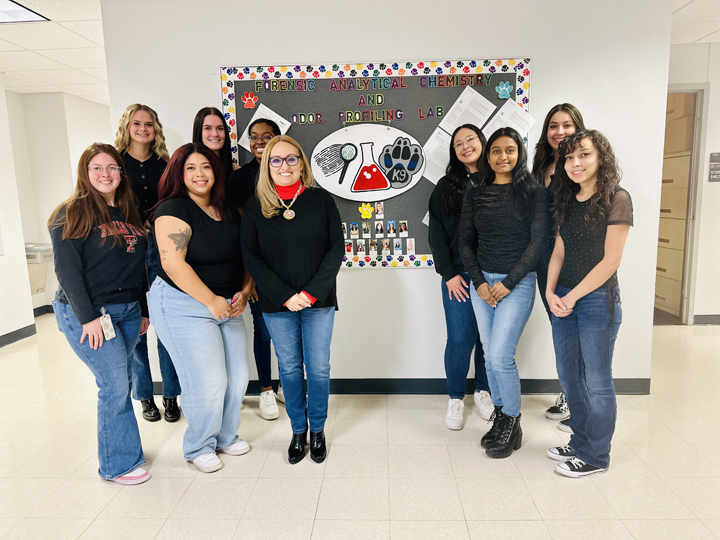
The Team
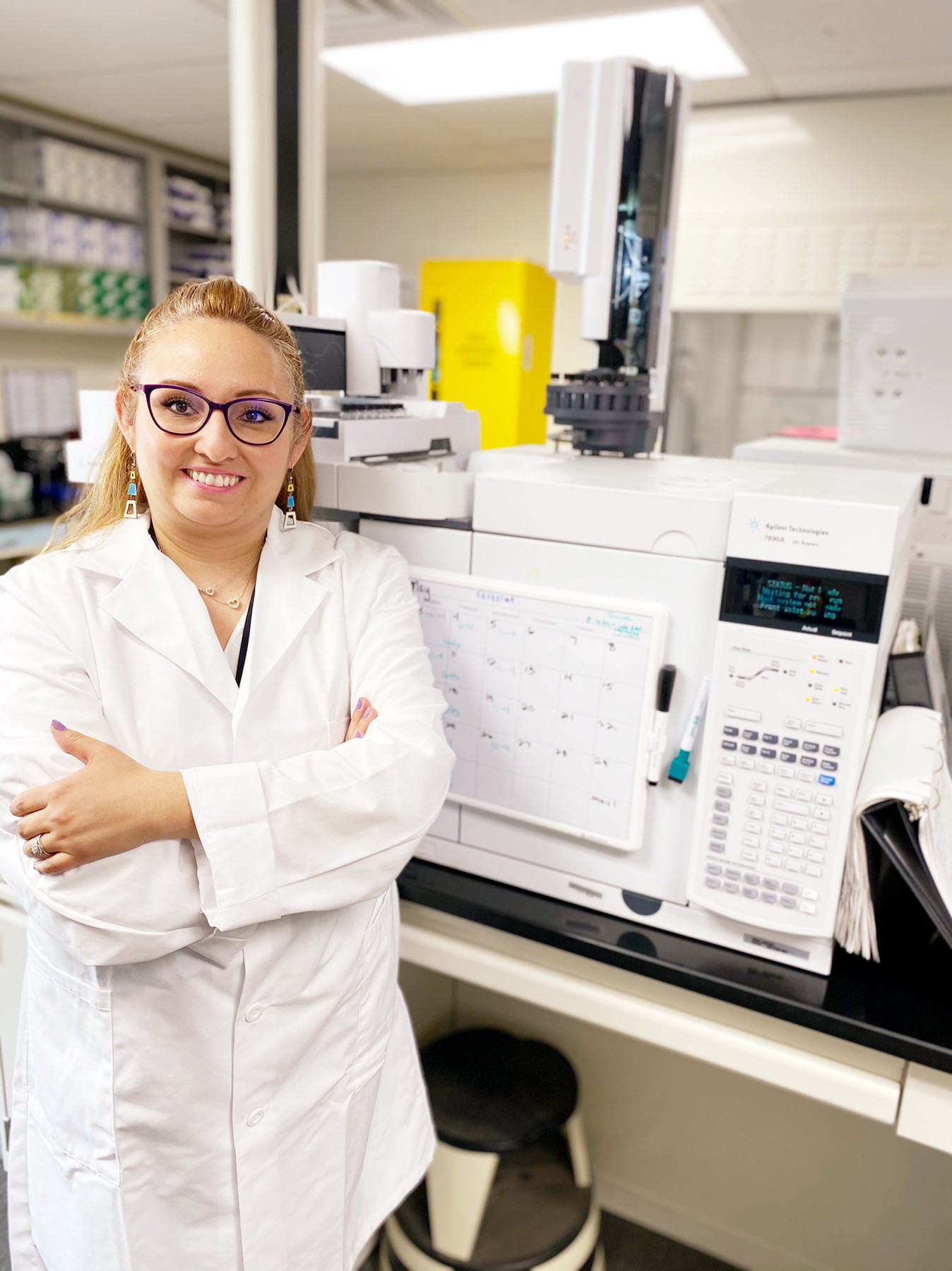 PI: Dr. Paola Prada-Tiedemann
PI: Dr. Paola Prada-Tiedemann
Dr. Paola A. Prada-Tiedemann is an Associate Professor & Academic program director for Forensic Science at TTU. Now, in her 10th year as faculty, she oversees all forensic science programs and mentors a diverse team of students, including one doctoral student, 9 master's students and one undergraduate student. Her research focuses on chemical odor analysis for canine detection applications, with multiple ongoing projects in this area. Dr. Prada-Tiedemann and her husband, a Sergeant with the Lubbock Airport Police Department, have two children: a 4-year-old son and a newborn daughter. Outside of spending time with her family, traveling the world is her passion!
Graduate Students
|
Courtney McGuire |
|
Gabrielle Greenstone |
|
Haylie Browning |
|
Lakshmi Reddi |
|
Celeste Medrano |
|
Nayelly Rangel |
|
Ana Munoz Sydney Sylvester UNDERGRADUATELaura Henriksen |
PREVIOUS GRADUATE STUDENTS
| KATIE BLANAR The use of Entomological samples as potential odor biomarkers for decomposition, M.S. - 2019. |
| KIANA HOLBROOK The instrumental evaluation of blood decomposition volatiles on various substrates and their relationship to presumptive test methods, M.S. - 2019. |
| JENNIFER RAYMER Evaluation of decomposition residual odor using susscrofa as sampling model, M.S. - 2019. |
| THY NGUYEN A Novel Method for the Creation of Explosive Detection Training Aids for Canines using an Olfactometer, M.S. - 2018. |
| Amanda Patrick Condom Odor Profiling with HS-SPME and Temperature effect on Condom Fingerprint Development, M.S. - 2018. |
| LAUREN ALEJANDRO The Evaluation of Canine Training Aids Over Time on Working Dog Performance, M.S. - 2018 |
| SILAS KEMBOI Hand Odor Volatiles and Drug Abuse: A Pilot Study using a Chemical Dependent Target Group, M.S. - 2018 |
| KASHMIERE MCGEE Human Skeletal Evidence: Perspectives for Narcotrafficking Group Identifications Through Modus Operandi From Costa Rica, M.S. - 2018 |
| COURTNEY BROWN Arsenic fed piglets: Assessing arsenic levels in decomposing pig tissues and soil samples, M.S. - 2017 |
| MICHAEL RADFORD Fingerprint Visualization on Condoms, M.S. – 2016 |
Department of Environmental Toxicology
-
Address
Department of Environmental Toxicology, Texas Tech University, Box 41163, Lubbock, TX 79409 -
Phone
806.742.4567

